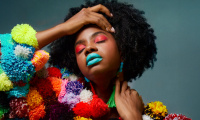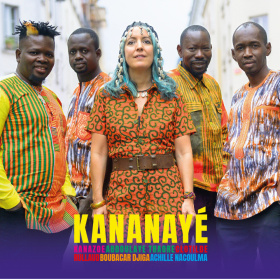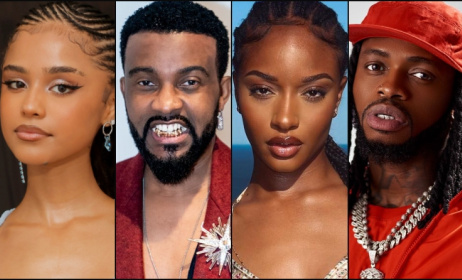Rising stars lead Spotify Afrobeats celebration in Lagos
In Lagos last Friday, by the end of Spotify’s Afrobeats Celebration, a question arose about the absence of genre leaders at an event marking its significant milestones. It also revived a familiar argument on the shortage of new superstars, as figures like Davido, Burna Boy and Wizkid have retained their dominant positions for many years.
 FAVE performing at Spotify's Afrobeats Celebration in Lagos last week. Photo: Insigna Online
FAVE performing at Spotify's Afrobeats Celebration in Lagos last week. Photo: Insigna Online
Their non-attendance, despite justifiable reasons like Wizkid laying his mother to rest around the same time and potential scheduling conflicts for the others, left me pondering the impact their presence could have had at an event aimed at tangibilating Spotify’s dedicated site tracking the Naija-led pop sound’s ascent from its West African origins to global success. The first day focused on podcasts, with the second hosting a party with Afrobeats fans.
Afrobeats’ first rank, which now includes ‘Calm Down’ man Rema, behind the first African artist-led track to cross a billion streams on Spotify, was missing. Instead, organisers lined up an alternative contingent in Bloody Civilian, FAVE, Shallipopi, Sarz and Ruger for the event’s climax, with Pheelz taking the stage the day before. In its own way, this particular action draws attention to Afrobeats’ pool of stars beyond its leading batch, and that beneath that first layer is a thriving league of heirs who have ensured that since 2017, the genre’s streams on Spotify have gone up by more than 500%.
“Ain’t no party like a Lagos party,” Banky W once sang. The main event, hosted by MIA, whose energetic presence transcended her petite frame adorned in a dress and sneakers, encapsulated the quintessence of Afrobeats in one of its birthplaces.
Two DJs, clad in matching African print ensembles, sporting hats and twinkling masks, set things off, with eclectic fusions that stress the underlying philosophy of the genre. The event’s musical selection effectively charted the trajectory of Nigerian pop, and at points, ignited debates about the genre’s origins, with discussions wheeling between Ghana and Nigeria, much like the quest for jollof supremacy.
FAVE, with her bleached hair and eyebrows, delivered soulful reflections on love, intensifying her connection with the audience. They joined in, singing along to tracks like ‘Mr Man’, ‘Beautifully’, ‘Baby Riddim’ and ‘Pop Sermon’. Her time on stage peaked with a performance of ‘Kante’, her breakthrough collaboration with Davido.
The stage was then handed over to Shallipoppi, the breakout star of 2023, accompanied by an outsized gorilla mascot. His presence affirmed the place of rappers within Afrobeats, which traditionally favours singers. As of tonight, he was a chart-topping artist and made sure to point that out. People climbed onto their seats, smartphones held aloft, capturing the new messiah. Others filmed themselves, main characters in their own stories, resonating with his curious street pop celebrating tech magnate Elon Musk or glorifying ex-convicts.
Following Shallipoppi, Sarz assumed control for a long DJ set to the side of the stage. Renowned for crafting hits for Wizkid, Burna Boy, Wande Coal and a host of others, his set was dictated by dance, and included a blend of R&B, South African house, soukous and amapiano. Tems, Ayra Starr, Magic System, Ami Faku, Drake, Michael Jackson and Fela all found a place in his playlist, connected through soft, shared chord progressions. He eventually gets to his own stuff: ‘Monalisa’ with Lojay, ‘Samba’ with Wizkid, and ‘Good Morning Riddim’. His set concluded three minutes before the stroke of midnight.
Sporting his signature eye patch and accompanied by a live band, Ruger, the night’s final act, initiated his performance with ‘Tour’, like is the case with his debut album Ru The World. That song discusses his ascent to international notice. He would soon pivot to explicit content, his forte. On that theme, he’s so charismatic, you would think he’s a climate change activist. What’s a popstar without his dose of grandiose delusion? Ruger needs to hear his name screamed back at him and instructs the crowd to comply. They do. He also commands waist movements. Front cameras come alive again for ‘Snapchat’. ‘WeWe’ and ‘Ashana’ followed.
Before ‘Red Flags’, which critiques women’s bad romantic choices, he delivered a sermon about the illusion of female singleness. No woman is truly single, he theorised. They’re always in the middle of something. Is this scientific? We would never know. The crowd, more fixated on dancing anyway, dwells on the statement’s comic underpinnings. This is neither the time nor place for controversial social psychology.
Ruger briefly halted the performance to address sound issues, before delving into ‘I Want Peace’.
Afrobeats’s elite might have gone AWOL, but their music was a key component to the colour of the night, notably, Burna Boy ‘City Boys’. As Spotify’s global head of artist partnerships and audience Joe Hadley told me on the sidelines of the concert, the path to the next billions of streams for Afrobeats involves supporting current superstars while also nurturing those in the genre’s next generation. It’s instructive that Afrobeats’ superstars are getting younger and younger, exemplified by the most exported act, 23-year-old Rema. Spotify effectively conveyed this paradigm at its Afrobeats celebration, stressing the key role of both experienced and emerging Afrobeats performers in determining the sound’s future.






























Commentaires
s'identifier or register to post comments